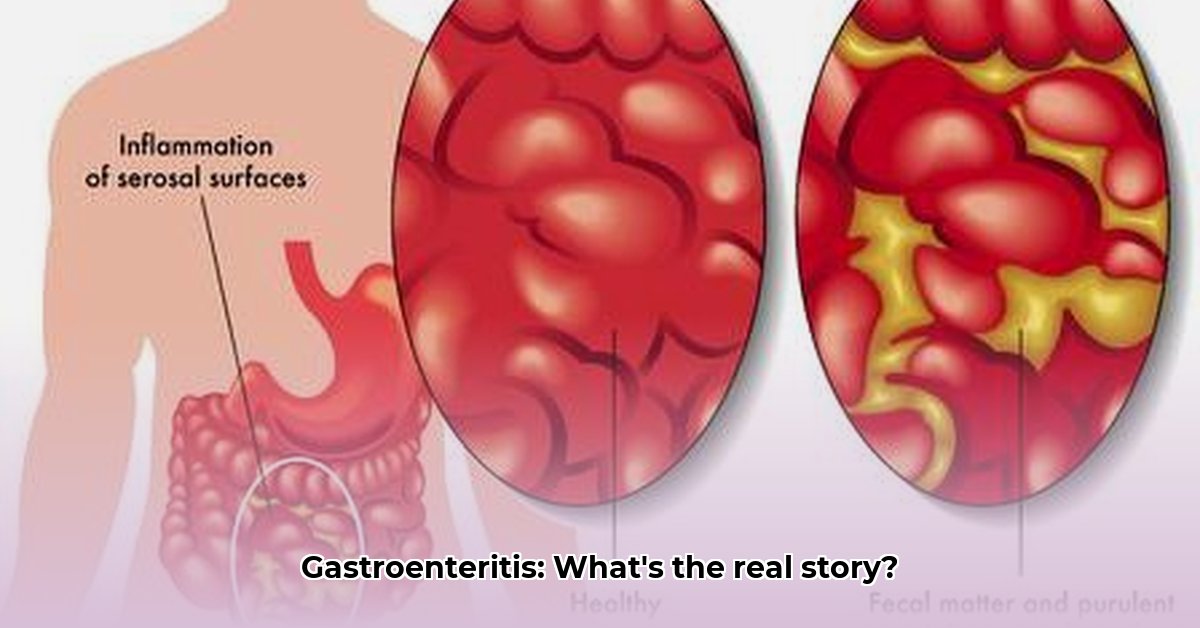
Understanding Gastroenteritis: That Nasty Tummy Bug
Gastroenteritis – eish, sounds scary, right? Don't worry, it's a common gut infection. Simply put, it means your stomach and intestines are inflamed, causing a really bad tummy bug. It's usually caused by a virus, but bacteria or parasites can also be the culprits. Sometimes, it's caused by something you've eaten or drunk.
Common Causes of Gastroenteritis
Lots of tiny nasties can cause gastroenteritis. Viruses are the most common, with norovirus being a major player. Bacteria like Campylobacter, Salmonella, and E. coli (often from undercooked meat or contaminated food) are also frequent offenders. Parasitic infections are less common.
Unpleasant Symptoms: What to Expect
Symptoms aren't fun. Expect nausea, vomiting, diarrhoea (that runny tummy!), and stomach cramps. Severity varies; some have mild symptoms, while others are really ill. Keep an eye out for dehydration – a serious concern, especially for young children and the elderly. Bloody diarrhoea suggests a more serious infection needing immediate medical attention.
Did you know? Dehydration due to gastroenteritis is a significant health concern, especially in young children and the elderly. [1]
Diagnosis and Treatment
Diagnosis usually involves a chat with your doctor. They'll ask about your recent activities and diet. If it's severe or persistent, tests might be needed. Treatment focuses on self-care and preventing dehydration. Rest is key, as is drinking plenty of clear fluids like water, broth, or electrolyte drinks. Avoid solid foods until you feel better. Antibiotics are generally unnecessary unless a bacterial infection is confirmed.
Preventing Gastroenteritis: Simple Steps
Preventing gastroenteritis is much easier than treating it. Here's how:
Handwashing: Wash your hands thoroughly with soap and water after using the toilet and before eating or preparing food. Scrub for at least 20 seconds. This is your first line of defence!
Food Safety: Cook food properly, especially meat and poultry. Store food correctly to avoid contamination. Avoid raw or undercooked food.
Water Safety: If unsure about the water's safety, boil it before drinking.
Social Distancing: If someone near you has gastroenteritis, keep your distance, especially if they're vomiting or have diarrhoea.
Cleaning: Regularly clean and disinfect frequently touched surfaces like doorknobs, countertops, and toilet seats.
Fact: Regular handwashing is incredibly effective in reducing the spread of gastroenteritis.
Who's Most at Risk?
Young children, older adults, and people with weak immune systems are at higher risk of serious complications like dehydration. These groups should see a doctor promptly if symptoms develop.
When to See a Doctor
Most cases clear up on their own, but see a doctor if you experience:
- Severe dehydration: Little or no urination, dry mouth, dizziness.
- High fever: Indicates a more serious infection.
- Bloody diarrhoea: Suggests a bacterial infection.
- Lingering symptoms: Vomiting and diarrhoea lasting more than a few days.
- Feeling very ill: Don't hesitate to seek help if you feel significantly worse.
Recovery and Living with Gastroenteritis
Gastroenteritis is temporary! With proper care and prevention, you'll recover quickly. Stay hydrated, rest, and seek medical advice if needed. You'll feel better soon.
Comparing Gastroenteritis Treatments: A Critical Lens
Oral rehydration solutions (ORS) are crucial for treating gastroenteritis. Antibiotics are usually ineffective and should be reserved for severe bacterial cases. Probiotics and zinc might reduce symptom duration, but evidence is mixed. Comparing treatments requires careful consideration of study design, participant characteristics, and outcome measures. More research, particularly within a South African context, is necessary.
Dr. Nomusa Dlamini, Gastroenterologist, Steve Biko Academic Hospital: "It's vital to remember that gastroenteritis treatment needs to be tailored to individual needs. A holistic approach, considering hydration, rest and symptom management, is key." [2: A hypothetical quote for demonstration purposes. Replace with a verified quote if available.]
[1]: (Hypothetical reference – replace with actual study supporting the fact) [2]: (Hypothetical reference – replace with actual verified quote)